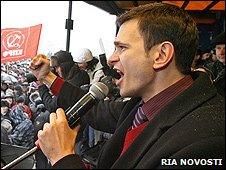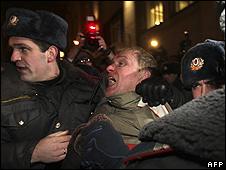'Honey traps' target Russian dissidents
- Published

A clip on the web purports to show Mr Yashin discussing a police bribe
A Russian opposition activist who was a victim of a sophisticated "honey trap" operation in Moscow has told the BBC there are more videos ready to be posted on the internet to discredit other government critics.
Ilya Yashin, of the group Solidarity, is one of five opposition figures to have appeared in videos posted on Russian websites after being secretly filmed having sex with a woman who had lured them back to an apartment rigged with cameras.
The videos started to be posted on the internet at the end of March.
"The scale of the operation is stunning. It is a real special operation…. it looks like hundreds of thousands of US dollars were spent on it," Mr Yashin said.
"At least four flats were used and at least four girls took part. About a dozen people were trapped, (but)... the videos have not been published of some of those who were filmed."
Slow seduction
Mr Yashin, who is unmarried, says his encounter with "Katya" dates back almost two years.
He thought he was getting involved in a summer romance.

Ilya Yashin addressed an opposition rally in Kaliningrad in January
"I'd been dating her for about a month, going to the cinema and cafes," he said.
"She was pretty and I fell for her and behaved like any single young person would."
"I didn't suspect anything until drugs and sex toys were brought out. Instinctively I felt something was wrong and left."
But it was already too late. Enough embarrassing footage had already been filmed.
Kremlin blamed
Those behind the operation clearly wanted to make an example of Mr Yashin, as he also appeared in another video allegedly showing him trying to bribe a traffic policeman who had ordered him to pull over as he drove through the capital.
He says it was a set-up and the video has been heavily edited.
Convinced he knows who was behind the operation, he has formally asked prosecutors to investigate two government officials, including a very senior member of the Kremlin administration.

Many opposition rallies have been broken up by police
But why would they act now against the small and disparate opposition groups?
"The year started with mass protests in many Russian regions," says Mr Yashin.
"In Kaliningrad 12,000 people took to the streets demanding (Prime Minister) Putin's resignation, in Arkhangelsk 2,000 and there were also demonstrations in Samara and Irkutsk.
"In many regions the opposition was at the helm of protests and it caused the Kremlin to worry."
Old KGB tactic
The government has always moved quickly to stamp out political protests, however small, apparently fearing they could spread and ultimately lead to an uprising similar to the Orange Revolution in Ukraine five years ago.
The honey trap was a favoured tactic of the KGB in Soviet times, when it was used to compromise Western diplomats, intelligence agents and other officials.
And diplomats continue to be targeted in this way. Less than a year ago the British deputy consul-general in Yekaterinburg was forced to step down after compromising footage appeared on the internet.
But not everyone is convinced the smear campaign against opposition activists is the direct work of the Kremlin and secret services.
"It looks like organisations connected to the Kremlin did this now to justify their existence and show their relevance," says Andrei Soldatov, a journalist and author who tracks the intelligence agencies.
He says the website where one of the videos was first posted is connected to a youth group set up in 2005 when Vladimir Putin was president. One of two such groups, its mission was to counter opposition activity in the run-up to the parliamentary and presidential elections in 2007 and 2008.
"The elections went ahead no problem," he says. "So now these organisations have to justify why they are financed today."
But the two pro-Kremlin youth groups, called Nashi and Young Guard, deny any involvement.
"Rubbish," says Nikita Borovikov, the Nashi leader. "That's silly and funny".